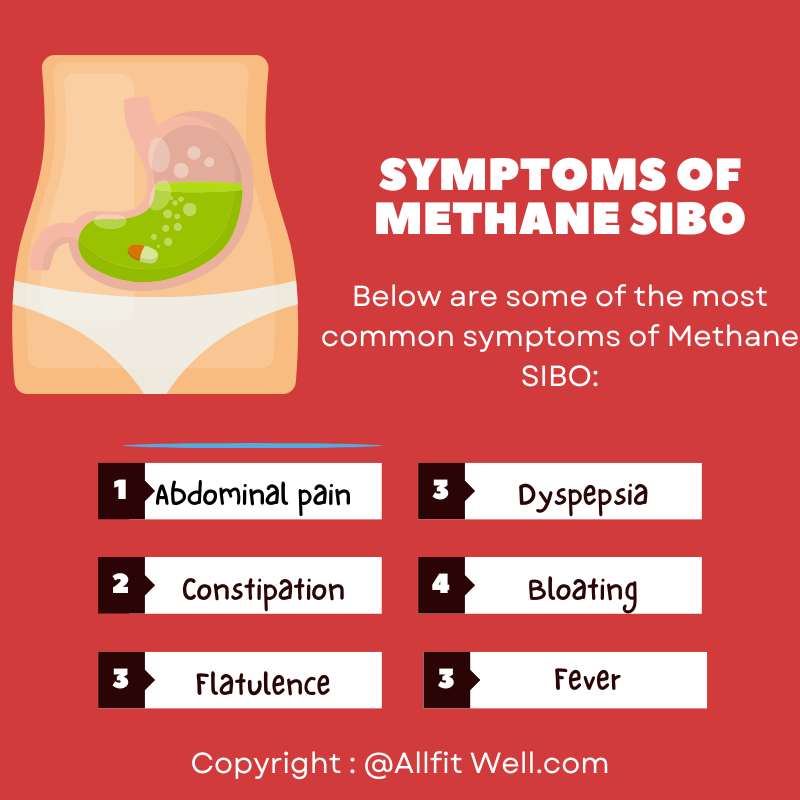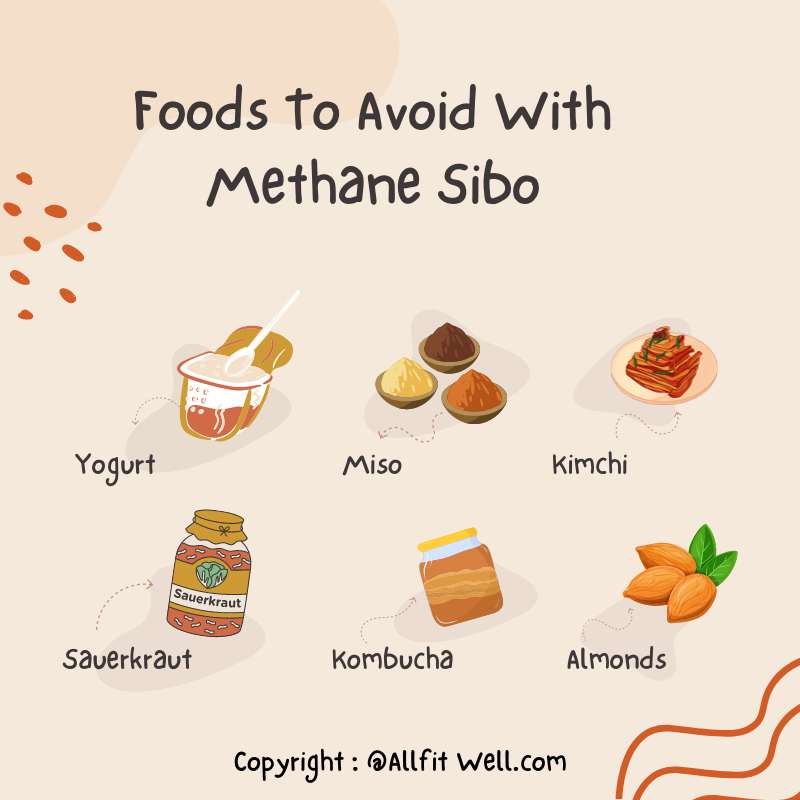Small Intestinal Bacterial Overgrowth (SIBO) occurs when bacteria that normally grow in other parts of the gut migrate to the small intestine and overgrow there.
Methane-dominant SIBO is characterized by an overgrowth of methane-producing bacteria.
Symptoms of methane SIBO can include bloating, constipation, abdominal pain, Dyspepsia, excessive gas, and possibly nausea.
Recently, one of our community members confronted methane SIBO and sought guidance on understanding and treating it.
Due to this reason, I am here to explain the symptoms linked with methane SIBO and natural treatment options.
What Is Methane SIBO?
SIBO or Small intestinal Bacterial Overgrowth is a clinical condition characterized by an increased level of bacteria in the intestine.
Methane SIBO or Constipation SIBO can be defined as the increased production of methane gas in the intestine.
While SIBO stands for bacterial overgrowth, it doesn’t quite fit in the traditional definition of it. It’s caused by organisms of the Archea family.
That’s why Methane SIBO is currently referred to as Intestinal Methanogen Overgrowth or IMO.

Common Symptoms Of Methane SIBO
As there is an increased colony of bacteria in the gut in SIBO, the overgrowth causes several symptoms. Below are some of the most common symptoms of Methane SIBO:
>Constipation
Constipation is the hallmark of Methane SIBO. It is the clinical symptom that differentiates it from Hydrogen SIBO.
The main cause of constipation is the excessive production of Methane gas. Methane can decrease the peristaltic movement of the gut, leading to a delayed transit time.
>Abdominal pain
The excessive growth of gut flora and methanogens produces hydrogen and methane in the gut.
These gases cause abdominal pain by decreasing gut motility and the distention of the abdomen can also cause dull visceral pain.
>Dyspepsia
Intestinal obstruction can cause dyspepsia. As there is severe constipation in Methane SIBO, the food materials remain in the GI tract for a longer period, which leads to the feeling of fullness and dyspepsia.
>Bloating
Partially digested and undigested food particles in the stomach and intestine cause abdominal bloating in Methane SIBO.
>Flatulence
Flatulence is also common in SIBO patients. The accumulation is due to excessive Methane production and outlet obstruction.
The symptom complex in Methane SIBO is the sequelae of constipation.
So, constipation along with flatulence, bloating, and abdominal pain are the cardinal features of Methane SIBO.
Causes Of Methane SIBO
There are multiple factors contributing to Methane SIBO. The root cause of Methane SIBO is an increased growth of methanogens.
The most common methanogen is Methanobrevibacter smithii.
Any gastric or intestinal outlet obstruction can lead to bacterial or methanogen overgrowth.
The following conditions can also lead to Methane SIBO:
- Medications including antibiotics, PPI or antacids
- Abdominal surgeries including hernioplasty, cholecystectomy, colostomy, or gastrojejunostomy
- Defect in the Ileocecal valve
- Imbalance in the normal flora of the gut
- Hypothyroidism
- Anorexia nervosa
One study revealed that there is also a close association of IBS with Methane SIBO.
Also Read: Parasite Die-Off Symptoms

Hydrogen SIBO Vs Methane SIBO
In most cases, you’d see two types of SIBO, hydrogen, and methane.
The hydrogen SIBO is mostly associated with the overgrowth of bacteria that causes increased production of hydrogen gas and it’s diarrhea-predominant.
Even though Methane SIBO is characterized by constipation, several hydrogen SIBO patients also develop constipation.
Therefore, clinical evaluation alone is not enough to diagnose and differentiate between these two.
Relation Between Hydrogen SIBO And Methane SIBO
There is a close link between hydrogen SIBO and Methane SIBO. Methane is composed of four hydrogen atoms with a carbon atom.
The organisms that produce a large amount of hydrogen gas in the gut are consumed by the Archea, meaning the products of Hydrogen SIBO lead to the production of methane gas inside the intestine.
Due to this, Methane SIBO can sometimes mask off hydrogen SIBO and the treatment of both problems is required for complete resolution.
Confirmatory Diagnostic Tool For Methane SIBO
I’ve previously discussed how it’s not feasible to differentiate hydrogen SIBO and Methane SIBO solely depending on the clinical evaluation.
In that case, the SIBO breath test is the tool for diagnosing Methane SIBO. The test is done by introducing lactulose or glucose and collecting three breath samples after three hours.
Methane level of 10 ppm in the sample is diagnostic of Methane SIBO.
Combination Therapy To Treat Methane SIBO
The treatment options for Methane SIBO include the complete remission of the disease by improving the gut epithelium, and gut motility, balancing the normal flora, and reestablishing the antimicrobial function of the gut.
A combination of antimicrobials, prebiotics, probiotics, and a balanced diet can help get a quick and efficient result within a few weeks.
Antimicrobial Therapy
Since It is not caused by bacteria, it becomes harder for antimicrobials to fight with methanogenic Archaea. They are mostly antibiotic-resistant.
But does it happen a lot? Look at these studies…
Studies(PubMed have revealed that Rifaximin and Neomycin have notable effects in treating Methane SIBO. The study also reveals, that Rifaximin only is effective in 56% of patients while it is 63% for Neomycin only.
The combination of both has an efficacy in 85% cases. But, Neomycin is a broad-spectrum antibiotic and has some serious adverse effects on the patients.
So,? Well, that brings us to our next treatment option.
Prebiotic And Probiotic Therapy
The combined use of Prebiotics and probiotics along with antimicrobials can be an effective weapon for treating Methane SIBO. A study reveals that using probiotics can significantly help in eradicating methanogens.
Lactobacillus reuteri is one such probiotic that can be used to treat this SIBO
Prebiotics like Partially hydrolyzed guar gum (PHGG) can help improve the symptoms of Methane SIBO and improve gut health.
It helps in increasing bowel motility and elevates the level of Bifidobacteria and Lactobacilli, two important normal flora.

Natural Herbal Antimicrobials For The Treatment Of Methane SIBO
The herbal (NCBI) antimicrobial agents have shown notable effects in treating Methane SIBO.
These are the herbs that can help you fight the disease naturally:
- Garlic
- Clove oil
- Thyme
- Peppermint oil
- Neem
Elemental Diet
Along with herbal and antimicrobial medications, diet can play an important role in reducing the symptoms of Methane SIBO.
A study (PubMed) has shown that ‘Elemental diet’ decreases the number of methanogens in the large gut.
This specified diet uses liquefied foods that are digested in the small intestine and thus the archaea in the large intestine are deprived of food.
Dr. Clifton Morris (MD) DipCNM mBANT is a Registered Therapist specializing in IBS and related conditions told that you can prevent Methane SIBO, a combination of awareness and a balanced diet can keep you away from relapse.
These are the approaches to follow:
- Introduce more diversity in your diet and fibers.
- Take prebiotics and probiotics regularly
- Make a good bowel habit.
- Treat any underlying disease that can harm your gut health.
Treatment Of Constipation
Constipation in Methane SIBO is tricky to treat. In other cases, the management of constipation includes a healthy amount of dietary fiber in the diet.
However, an increased consumption of fibers can lead to more fermentation by the microbiomes, increasing the methane level consequently.
Here’s how you can treat constipation in the case of Methane SIBO:
- Magnesium oxide
- Enema and laxatives
- Flaxseeds
- Low FODMAP diet.
Duration Of Methane SIBO Treatment
The duration of treatment depends on the approaches. Natural herbal therapy can take anywhere between 3-4 weeks and antibiotics take 1-3 weeks to cure Methane SIBO.
The combination of Prebiotic and Probiotic will help cure the disease within 1-3 months.
Bottom Line
I hope this guide and list of symptoms help you deal with your Methane SIBO symptoms.
If you have at least 3 of these symptoms, it’s a good idea to go to the hospital. Before getting tested, I suggest trying some treatment first.
References:
https://pubmed.ncbi.nlm.nih.gov/14992438/
https://www.eurekaselect.com/article/50316
https://www.ncbi.nlm.nih.gov/pmc/articles/PMC4030608/





